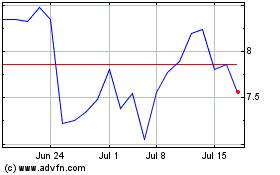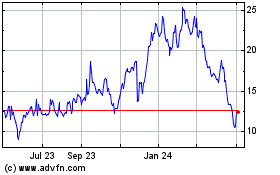Cabaletta Bio Presents Updated Interim DesCAARTes™ Trial Phase 1 Data at the ASGCT 25th Annual Meeting
May 18 2022 - 7:00AM

Cabaletta Bio, Inc. (Nasdaq: CABA), a clinical-stage biotechnology
company focused on the discovery and development of targeted cell
therapies for patients with autoimmune diseases, today presented
updated clinical and translational data through 6 months of
follow-up in cohorts A1 through A3, safety data through 3 months
and persistence data through 1 month of follow-up in cohorts A1
through A4 from the DesCAARTes™ trial at the American Society of
Gene & Cell Therapy (ASGCT) 25th Annual Meeting being held in
Washington, D.C. from May 16-19, 2022.
“At ASGCT, we presented updated interim data showing that
DSG3-CAART has had a favorable safety profile with no dose limiting
toxicities or cytokine release syndrome of any grade through cohort
A4, which was a dose of 2.5 billion DSG3-CAART cells. In addition,
we have observed a dose dependent increase in DSG3-CAART
persistence, which at cohort A4 approached the lower end of the
range that is observed in anti-CD19 CART oncology studies in
combination with lymphodepletion,” said David Chang, M.D., Chief
Medical Officer of Cabaletta. “These data continue to support the
planned dose escalation in this trial and our conviction in the
potential of this program. As we progress through additional
cohorts of the study, we look forward to evaluating the
relationship between DSG3-CAART persistence and potential clinical
responses in patients with mPV along with the opportunity to
explore higher doses and an enhanced manufacturing process to meet
our goal of reaching deep, durable and potentially curative
responses for these patients.”
Cabaletta’s DesCAARTes™ Phase 1 trial is an open-label, dose
escalation, multi-center study of DSG3-CAART in adults with
mucosal-dominant pemphigus vulgaris (mPV). The trial is designed to
determine the maximum tolerated dose of DSG3-CAART in adult
subjects with active, anti-DSG3 Ab positive, biopsy confirmed mPV
that is inadequately managed by one or more standard therapies. The
primary endpoint is incidence of adverse events (AEs), including
dose-limiting toxicities (DLTs), such as cytokine release syndrome
(CRS) and neurotoxicity, related to DSG3-CAART within three months
of infusion. Secondary endpoints include CAART persistence (qPCR),
anti-DSG3 Ab levels (ELISA) and disease activity (PDAI). The trial
is currently in cohort A5 (5.0 to 7.5 billion cells) and is being
conducted across multiple clinical sites throughout the United
States. The Company plans to include two new additional dose
cohorts – A5e (enhanced manufacturing process at 5.0 to 7.5 billion
cells) and A6m (multi-dose regimen at 10 to 15 billion cells). The
prioritization of cohorts following cohort A5 (e.g. A5e or A6m) is
subject to evaluation of emerging data and discussions with the
FDA, as applicable.
The updated interim DesCAARTes™ trial Phase 1 data included 12
treated subjects, four cohorts with three patients per cohort; nine
having completed six months follow up after DSG3-CAART infusion.
The posters as presented at ASGCT are available at
https://www.cabalettabio.com/technology/posters-publications. The
data show:
- No DLTs, CRS of any grade, or related serious AEs were observed
in any subject within three months of DSG3-CAART infusion through
cohort A4 (2.5 billion cells).
- There was a dose dependent increase in DSG3-CAART persistence
through day 29 in cohorts A1 to A4, indicating that DSG3-CAART
cells were not eliminated through immune-mediated rejection.
- Persistence (AUCd29 and Cmax) in cohort A4 approached the lower
end of the range that is observed in clinical trials of anti-CD19
CART combined with lymphodepletion in B-cell malignancies
- In cohorts A1 to A3:
- Disease activity was clear or almost clear (PDAI 0-1) in 0/9
subjects at screening, 1/9 at pre-infusion, 2/9 at month one, 5/9
at month two, 3/9 at month three, 2/9 at month four, 3/9 at month
five and 1/9 at month six after treatment.
- Through six months post DSG3-CAART infusion, no clear pattern
was observed in changes in anti-DSG3 Ab levels (ELISA) or disease
activity (PDAI) in the low dose cohorts where the A3 dose (500
million cells) represents 6.7 to 10% of the ongoing cohort A5 dose
(5.0 to 7.5 billion cells).
- One subject from cohort A1 was retreated with 500 million cells
(the cohort A3 dose) and persistence in the subject was similar to
the three subjects who were originally administered the cohort A3
dose, suggesting that there was not immune-mediated clearance of
DSG3-CAART cells after retreatment and repeat dosing of patients is
possible, if indicated.
Data presented on the company’s manufacturing process were as
follows:
- In cohorts A1-A4, the manufacturing success rate was 100% with
functional DSG3-CAART cells manufactured successfully from mPV
patient apheresis material.
- Infused DSG3-CAART cells exhibited a stem cell or central
memory phenotype with a strong positive correlation between the
dose of gene modified T cells and post-infusion persistence to day
29.
- These data suggest that DSG3-CAART cells are not being
eliminated by the pre-existing anti-DSG3 immunity present in
mPV.
About Cabaletta BioCabaletta Bio (Nasdaq: CABA)
is a clinical-stage biotechnology company focused on the discovery
and development of engineered T cell therapies that have the
potential to provide a deep and durable, perhaps curative,
treatment for patients with autoimmune diseases. The CABA™
platform, in combination with Cabaletta Bio’s proprietary
technology, has advanced a growing pipeline that currently includes
potential treatments for patients with mucosal pemphigus vulgaris,
MuSK-associated myasthenia gravis, PLA2R-associated membranous
nephropathy, mucocutaneous pemphigus vulgaris and hemophilia A with
FVIII alloantibodies. Cabaletta Bio’s headquarters are located in
Philadelphia, PA. For more information,
visit www.cabalettabio.com and follow us on LinkedIn.
Forward-Looking StatementsThis press release
contains “forward-looking statements” of Cabaletta Bio within the
meaning of the Private Securities Litigation Reform Act of 1995, as
amended, including without limitation, express or implied
statements regarding expectations regarding: Cabaletta’s ability to
grow its autoimmune-focused pipeline; the progress and results of
its DesCAARTes™ Phase 1 trial, including Cabaletta’s ability to
enroll the requisite number of patients, dose each dosing cohort in
the intended manner, and progress the trial; the expected
significance and impact around the clinical and translational data
updates from cohorts A1 through A3 of the DesCAARTes™ trial,
including 3-month safety and 1-month persistence data in cohorts A1
through A4, described herein; the expected timing and significance
of the announcement of 28-day safety for cohort A5 and clinical and
translational data for cohort A4 in mid-2022; the expectation that
Cabaletta may improve outcomes for patients suffering from mPV;
Cabaletta’s ability to continue progressing in cohort A5, including
the planned addition of an enhanced manufacturing process;
Cabaletta’s ability to escalate dosing as high as 10 to 15 billion
cells in a planned future cohort or otherwise; Cabaletta’s ability
to advance dose escalation in the DesCAARTes™ Phase 1 trial at the
current dose ranges for the current cohorts and any projected
potential dose ranges for future cohorts, and to optimize its
targeted cell therapy; Cabaletta’s ability to evaluate, and the
potential significance of, the relationship between DSG3-CAART
persistence and potential clinical responses in patients with mPV;
Cabaletta’s ability to safely retreat additional patients and
whether Cabaletta will continue to observe a lack of
immune-mediated clearance of DSG3-CAART cells after retreatment and
repeat dosing of patients; the expectation that Cabaletta Bio may
improve outcomes for patients suffering from MuSK MG; plans to
initiate patient dosing in an open-label Phase 1 clinical trial to
evaluate MuSK-CAART safety and tolerability in MuSK MG patients in
2022; Cabaletta’s plans to advance development of its preclinical
pipeline; presentation of additional data at upcoming scientific
conferences, and other preclinical data; expectations regarding the
design, implementation, timing and success of its current and
planned clinical trials and the successful completion of
nonclinical studies; planned potential timing and advancement of
its preclinical studies and clinical trials and related regulatory
submissions; ability to optimize the impact of its collaborations
on its development programs; the impact of COVID-19 on the timing,
progress, interpretability of data, and results of ongoing or
planned preclinical and clinical trials; statements regarding the
timing of regulatory filings regarding its development
programs.
Any forward-looking statements in this press release are based
on management’s current expectations and beliefs of future events,
and are subject to a number of risks and uncertainties that could
cause actual results to differ materially and adversely from those
set forth in or implied by such forward-looking statements. These
risks and uncertainties include, but are not limited to: the risk
that signs of biologic activity or persistence may not inform
long-term results; Cabaletta’s ability to demonstrate sufficient
evidence of safety, efficacy and tolerability in its preclinical
and clinical trials of DSG3-CAART; the risk that persistence
observed with effective CART-19 oncology studies in combination
with lymphodepletion is not indicative of, or applicable to,
clinical responses in patients with mPV; risks related to clinical
trial site activation or enrollment rates that are lower than
expected; risks related to unexpected safety or efficacy data
observed during clinical studies; risks related to the impact of
public health epidemics, such as the ongoing COVID-19 pandemic,
affecting countries or regions in which we have operations or do
business; Cabaletta’s ability to retain and recognize the intended
incentives conferred by Orphan Drug Designation and Fast Track
Designation for DSG3-CAART for improving healing of mucosal
blisters in patients with mucosal pemphigus vulgaris; Cabaletta’s
ability to demonstrate sufficient evidence of safety, efficacy and
tolerability in its preclinical and clinical trials of DSG3-CAART;
risks related to Cabaletta’s ability to protect and maintain its
intellectual property position; uncertainties related to the
initiation and conduct of studies and other development
requirements for its product candidates; the risk that any one or
more of Cabaletta’s product candidates will not be successfully
developed and commercialized; and the risk that the initial or
interim results of preclinical studies or clinical studies will not
be predictive of future results in connection with future studies.
For a discussion of these and other risks and uncertainties, and
other important factors, any of which could cause Cabaletta’s
actual results to differ from those contained in the
forward-looking statements, see the section entitled “Risk Factors”
in Cabaletta’s most recent annual report on Form 10-K as well as
discussions of potential risks, uncertainties, and other important
factors in Cabaletta’s other filings with the Securities and
Exchange Commission. All information in this press release is as of
the date of the release, and Cabaletta undertakes no duty to update
this information unless required by law.
Contacts:
Anup MardaChief Financial Officerinvestors@cabalettabio.com
Sarah McCabeStern Investor Relations,
Inc.sarah.mccabe@sternir.com
Cabaletta Bio (NASDAQ:CABA)
Historical Stock Chart
From Aug 2024 to Sep 2024

Cabaletta Bio (NASDAQ:CABA)
Historical Stock Chart
From Sep 2023 to Sep 2024
